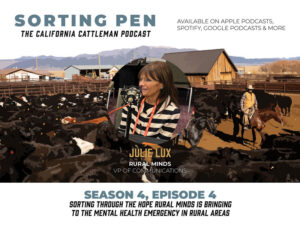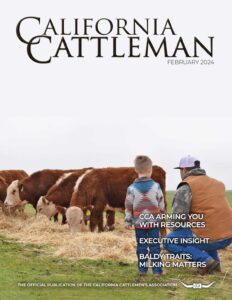
CALIFORNIA CATTLEMAN WEEKLY
February 20, 2024
To read the full version each week, please subscribe below.
CDFW Releases Five Months of Wolf Depredation Investigation Reports
Last Monday the California Department of Fish and Wildlife (CDFW) released 31 livestock loss determination reports investigating reported incidents of suspected depredations by wolves. The reports cover the period from August 23, 2023 through January 3. Among the 31 reports, the Department confirmed that 16 reported incidents were wolf attacks resulting in 22 livestock depredations (while a Department press release references “a loss of 18 livestock,” this total omits one calf and three lambs which were confirmed to have been injured by wolves).
All told, CDFW has confirmed 92 livestock depredations across 74 separate incidents since wolves returned to California in 2015, with another 15 incidents being deemed “probable” wolf depredations over that time. With seven wolf packs now identified in the state, depredation events have seen a marked increase recently. In 2023 alone, 37 livestock depredations by wolves were confirmed across 32 incidents, with another seven investigations finding “probable” depredation. Siskiyou County’s Whaleback Pack have been the most chronic depredators, responsible for 32 confirmed livestock kills and all seven probable depredations last year.
Of course, these depredation numbers are necessarily an undercount of actual livestock lost to wolves. In addition to cattle which are never found or which are found and never reported to the Department, several investigations have found carcasses too fully consumed to be analyzed, resulting in an “unknown” report finding.
Three depredation reports stand out among the nearly three-dozen released by CDFW last week. A November 18, 2023 investigation found the Whaleback Pack had killed a cow and her calf, as well as another calf – the largest single depredation event last year. A December 23, 2023 investigation attributed the killing of a 600-pound heifer to the newly-named Harvey Pack in western Lassen County, the first depredation explicitly attributed to that pack. Finally, the January 3 investigation is notable for two reasons. First, it was attributed to the newly-designated Beyem Sayo pack in eastern Plumas County. Second, while most reported wolf attacks in California have been upon cattle, lambs were targeted in the December 28 wolf attack, leaving one dead and three injured.
In its press release, CDFW noted that it is finalizing its “review of existing program applications and eligibility of livestock producers to receive payments for direct losses” (as we previously reported, CDFW expects existing applications to exhaust the $3 million appropriated in 2021 for its wolf/livestock compensation program). CCA is lobbying the Administration and Legislature to continue funding the Department’s wolf/livestock compensation program, meeting with several legislative offices on the topic just last week.
Finally, the Department notes that it will soon complete an evaluation of its compensation pilot program, which will be posted to CDFW’s gray wolf webpage. CCA will work to inform CDFW’s evaluation based on cattlemen’s feedback regarding the program.
New Episode of Sorting Pen: The California Cattleman Podcast
A new episode of Sorting Pen: The California Cattleman Podcast is out now! In this week’s episode, Vice President of Communications for Rural Minds Julie Lux, shares about the mental health emergency America’s rural communities are facing and provides resources. To listen to the episode click here.
UPDATE: President Biden Declares Major Disaster in San Diego County as State Contends with Additional Winter Storms
As previously reported in California Cattleman Weekly, Governor Gavin Newsom earlier this month proclaimed a state of emergency for the counties of Los Angeles, Orange, Riverside, San Bernardino, San Diego, San Luis Obispo, Santa Barbara and Ventura after an atmospheric river caused significant damage – including significant flooding – on the Central Coast and Southern California.
Shortly after proclaiming that state of emergency, Governor Newsom requested that President Joe Biden issue a major disaster declaration for San Diego County after that county was particularly hard-hit by flooding and other storm damage. Yesterday, President Biden granted that request, declaring a major disaster to exist in areas of San Diego County “affected by a severe storm and flooding from January 21 to January 23.”
The declaration enables San Diego County residents and business owners to access federal resources, including “grants for temporary housing and home repairs, low-cost loans to cover uninsured property losses, and other programs,” as they seek to recover from the storm’s impacts.
On Sunday, Governor Newsom announced that he had “activated the State Operations Center in Mather to help coordinate state, local and federal response to” another round of severe storms forecast to batter the state through tomorrow. CCA will keep members apprised of forthcoming state and federal responses to this newest round of storms. President Biden’s declaration hints to the potential need for further federal resources in the state, noting that “Additional designations may be made at a later date if requested by the state and warranted by the results of further damage assessments.”
UPDATE: FSA Offers Assistance for Winter Storm Damage
The California state office of USDA’s Farm Service Agency (FSA) has announced that the agency “has technical and financial assistance available to help farmers and livestock producers recover from” recent severe storms in the state.
“USDA stands ready to assist California farmers, livestock producers, landowners, and communities clean up and restore farmland, forests and watersheds in the aftermath of these devastating storms,” said Robert Bonnie, USDA Under Secretary for Farm Production and Conservation. “USDA employees are working diligently to deliver our extensive portfolio of disaster assistance programs and services.”
For information on available USDA Disaster Recovery Assistance, including the Livestock Indemnity Program and the Emergency Assistance for Livestock, Honeybees, and Farm-Raised Fish Program, see USDA’s news release. Impacted producers are encouraged to contact their local USDA service center “to report losses and learn more about program options available to assist in their recovery from crop, land, infrastructure, and livestock losses and damages.”
CalChamber Sues the State Over SB 253 Emissions Disclosure Requirements
The California Chamber of Commerce has announced that it joined the U.S. Chamber of Commerce and other groups in a lawsuit challenging CCA-opposed Senate Bill 253 (Wiener), the “Climate Corporate Data Accountability Act” signed into law last year. The lawsuit alleges that the legislation compels corporate speech on “controversial political matters” in violation of the First Amendment, intrudes upon the jurisdiction of the federal Clean Air Act in violation of the Constitution’s Supremacy Clause and encroaches upon regulation of interstate commerce in violation of the Constitution’s Commerce Clause. For more information, see the February 5 edition of California Cattleman Weekly.
Midpeninsula Regional Open Space District Now Accepting Request for Proposals to Lease District Property for Conservation Grazing
From the Midpeninsula Regional Open Space District
The Midpeninsula Regional Open Space District is accepting Request for Proposals (RFP) to lease District property for conservation grazing. The RFP is for three grazing units in San Mateo County: Bluebrush Canyon, Lone Madrone and Big Dinner/Mindego. The District invites qualified livestock operators to submit a proposal for one or more of the three listed grazing units. Proposals should reflect the operator’s relevant qualifications, experience, and desire to work with the District by utilizing conservation grazing to meet District goals.
To view the RFP package and for additional information click here. Viewing the RFP does require that applicants sign up for a free account to the public procurement site, Periscope. Instructions for signing up can be found here. For further questions contact Matthew Shapero at mshapero@openspace.org.
Upcoming CCA Events
CCA Steak and Eggs Legislative and Regulatory Breakfast + Lobby Day
March 13, 2024, Sacramento, CA
Join the California Cattlemen’s Association and other CCA members at the 43rd Steak and Eggs Legislative and Regulatory Breakfast + Lobby Day. Plan to be in Sacramento on Wednesday, March 13. Breakfast starts at 8am! Over breakfast, enjoy sharing about your ranch while meeting representatives from regulatory and legislative offices in Sacramento. Following the breakfast, attendees will head across the street to the state Capitol to continue conversations about ranching in California. To RSVP for the event, email our membership and events coordinator Gracie LeCheminant at gracie@calcattlemen.org or visit our website by clicking here.
2024 Feeder Meeting
May 22-23, 2024, San Diego, CA
The 2024 Feeder Meeting will take place at the San Diego Hilton Bayfront, May 22-23. For further information about the event and to book your room click here. To register, click here.
Upcoming Industry Events
The session are FREE to participate but registration is required. To register, click here.
UC Beef Cattle Symposium
March 16, 2024, UC Davis Gladys Valley Hall, Davis, CA
Unversity of California Cooperative Extension, UC Davis Department of Animal Science and UC Davis Veterinary Medicine are hosting a beef cattle symposium on Saturday, March 16, 2024 in Davis, CA. Topics that will be discussed include beef cattle health updates, beef carcass evaluation, emerging breeding technologies and much more. For more information and to register, click here.
2024 Ag Legacy Symposium
March 16, 2024, Sierra Valley Grange Hall, Vinton, CA
The 2024 Ag Legacy Symposium will take place on Saturday, March 16 in Vinton, CA. The event helps to prepare a farm, ranch or agribusiness for the transition to the next generation. The sessions will cover legal aspects, financial topics, political factors, family dynamics, and provide real life scenarios for you to consider incorporating into your succession plan. Early bird registration is $25 and includes morning refreshments, lunch, and materials. To register and view the agenda, click here.
UC Davis Young Cattlemen’s Artificial Insemination Clinic
March 25-27, UC Davis Feedlot and Beef Barn
The UC Davis Young Cattlemen’s Artificial Insemination Clinic will take place March 25-27 at the UC Davis Feedlot and Beef Barn. The signup form opens on Thursday, Feb. 22. Spots are filled on a first come first serve basis. To view the flyer click here. For further information and questions reach out to davisyoungcattlemens@gmail.com.
CCA in the News
California evaluating wolf-livestock compensation pilot program BEEF Magazine “CCA’s Vice President of Government Affairs Kirk Wilbur reports that a total of 38 cattle depredations by wolves were confirmed in 2023 across 33 incidents, with another seven incidents deemed ‘probable.’ Wilbur says the Whaleback pack in Siskiyou has become particularly habituated to preying on cattle, accounting for 33 confirmed depredations in 2023 and all seven of last year’s ‘probable’ depredation determinations.” To continue reading, click here.
Industry News
Nine California Counties Make Top-10 List for Ag Sales in the U.S. CDFA Planting Seeds Blog “The USDA’s National Agricultural Statistics Service (NASS) today announced the results of the 2022 Census of Agriculture, spanning more than six-million data points about America’s farms and ranches and the people who operate them. Among the findings — California continues to have nine of the top-10 counties in the U.S in agricultural production. Grant County, Washington ranked 10th.” To continue reading, click here.
Water Rights Annual Water Use Reports Due Now CDFA Planting Seeds Blog “If you have a California water right, you are required to submit a water use report to the State Water Resources Control Board each year. Reports for Water Year 2022-23 (Oct. 1, 2022 – Sept. 30, 2023) were due by Feb. 1, 2024. The California Water Resources Control Board reports that as of February 6, 2024, 42 percent of reports had not been submitted.” To continue reading, click here.
Forest Service warns of budget cuts ahead of a risky wildfire season – what that means for safety The Conversation “Moore told agency employees to expect budget cuts from Congress in 2024. His letter was thin on details. However, taken at face value, budget cuts could be interpreted as a reduction in the firefighting workforce, compounding recruitment and retention challenges that the Forest Service is already facing.” To continue reading, click here.
A new episode of Sorting Pen: The California Cattleman Podcast is out now! In this week’s episode, Vice President of Communications for Rural Minds Julie Lux, shares about the mental health emergency America’s rural communities are facing and provides resources. To listen to the episode click here.



